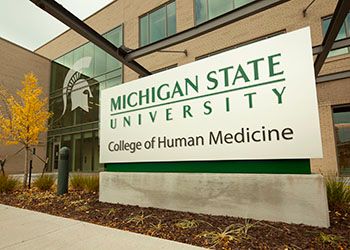Passionate Researcher Leads Vision for Women's Health
Support the College of Human Medicine
Passionate Researcher Leads Vision for Women's Health
Support the College of Human Medicine
January 11, 2016When Asgi Fazleabas (pronounced faaz-la-bas) came to MSU in 2009, the Center for Women’s Health was only a dream.
No building. A small staff of researchers. But what began with a vision has grown exponentially.
“We have far exceeded what I ever dreamed of,” Fazleabas said. “With the expansion of the medical school in Grand Rapids, the vision we had, the ability to recruit the brightest from Harvard, Yale and Baylor…we realized the excitement of building an outstanding research program.”
Which brings us to today, to the realized vision centered around women’s health—with Fazleabas at the helm as director. He is also professor and associate chair of research in obstetrics, gynecology and reproductive biology at MSU’s College of Human Medicine.
A sense of wonder
Reproductive research has always intrigued Fazleabas. Growing up in Sri Lanka, he distinctly remembers dreaming of becoming a reproductive and developmental biologist.
“Take a chicken egg, hold it up to a light and you can see its development for 21 days,” Fazleabas said. “I was absolutely fascinated with how unique and intricate biology is.”
It’s a process Fazleabas describes as magical; which led to desiring understanding on why diseases like endometriosis, fibroids or gynecological cancers can have such a profound effect on a significant number of women who suffer from these diseases to become pregnant.
With thousands of women worldwide receiving these diagnoses each year, understanding fundamental biology truly informs the work Fazleabas does. The research group looks at everything from the lifespan of a pregnancy to socio-economic barriers that prevent good prenatal care.
Charting a course
The best faculty and graduate students bring scientific discourse to centers, along with new knowledge. Centers can also collectively generate attraction of bright, new talent.
“By having so much intellect built into a center, we're not only creating an intellectual environment among peers and colleagues, but it's an incredible training resource for our students because they are being challenged to excel,” Fazleabas said.
With the new MSU Grand Rapids Research Center [GRRC] currently being constructed, Fazleabas admits people want to come and work here at Michigan State—but space has been a challenge.
“We are limited not by money or the commitment of the institution, but since we are simply limited by space, the building [GRRC] becomes an amazing recruiting tool,” Fazleabas adds.
“But there is no better place to be in the country right now than Michigan State University, I’m very proud of that.”
Learn more about supporting research at MSU.
Author: Sarah Wardell



